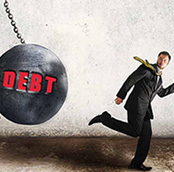Debtor–Creditor Law
The Different Types of Debtor-Creditor Relationships
 If you have outstanding debts and cannot pay them, you may seek to sell some of your property to settle your obligations. You can do this through a formal bankruptcy filing (although you must qualify to discharge debts under Chapter 7), or you can sell property privately. Regardless of the method you choose, the legal relationship between you and your debtors will determine who gets paid first, and what the process looks like.
If you have outstanding debts and cannot pay them, you may seek to sell some of your property to settle your obligations. You can do this through a formal bankruptcy filing (although you must qualify to discharge debts under Chapter 7), or you can sell property privately. Regardless of the method you choose, the legal relationship between you and your debtors will determine who gets paid first, and what the process looks like.
In a legal proceeding to collect on unpaid debts, first priority will always be given to parties that had a lien on assets (a secured creditor). Accordingly, if you try to sell property to satisfy outstanding debts (either through a bankruptcy proceeding or privately), a party with a lien will be paid first. The lien may be created by agreement of the parties or by law, or it may be ordered by a court.
If all lienholders are paid and there are still funds remaining, any party with a “priority interest” will be paid next. Priority interests are established by state and/or federal law.
If all secured creditors and all creditors with a priority interest have been paid, and there are still funds left, unsecured creditors without any statutory priority interest will be entitled to recover payment.
If you choose to sell property through a bankruptcy petition, the process will be governed almost exclusively by federal law (the federal bankruptcy code). If, however, you opt to resolve your debt problems outside of the bankruptcy process, your actions may be governed by state or federal law. Most liens are enforceable under state statutes, but there are federal laws, such as the Fair Debt Collection Practices Act and the Consumer Credit Protection Act that may limit your actions in a debtor-creditor dispute.
Connect with Top-rated Attorneys Near You
Sponsored Advertisement
Latest Article
Wishing You And Yours A Merry Christmas & Happy New Year
... Read More
The Subrogation Process: What Is It and Why Is It Important?
How Does Subrogation Facilitate the Payment of Insurance Claims? When you are involved in a motor vehicle accident and ... Read More
The Legal Recognition of Common Law Marriage
Is Common Law Marriage Still Enforced? How Is a Common Law Marriage Terminated? The vast majority of people who get mar... Read More
GETLEGAL®ATTORNEY DIRECTORY
Find Leading Attorneys in Your Area
NEED PROFESSIONAL HELP?
Talk to an Attorney
How It Works
- Briefly tell us about your case
- Provide your contact information
- Choose attorneys to contact you





